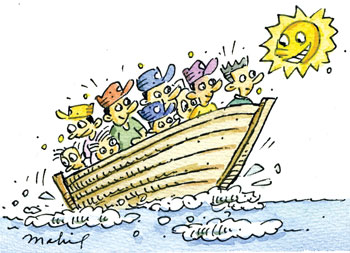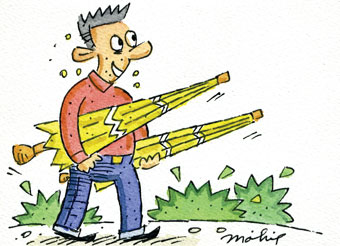|

by R. S. Karunaratne
The use of adjectives
Adjectives usually come before nouns.
Nanda is a good singer.
Paba is an excellent actor.
Raman is a bright boy.
Sheela is a lazy girl.
Pubudu is a hard-working boy.
However, in a few special cases, adjectives are used after nouns.
Who is the Secretary General of the United Nations?
The General was tried by a Court Martial. (Military court)
The Attorney General has been appointed as the Chief Justice.
|

After crossing the river, the pilgrims reached the mountain
proper. |
Adjectives ending in '-able' and '-ible' are used after nouns.
He bought all the sweep tickets available.
Is devolution of power the only solution possible?
When 'present' is used before a noun it refers to time. When it is used
after a noun it refers to 'here' or 'there'.
The members present in Parliament voted for the Land Reform Bill.
The present members have no experience in parliamentary affairs.
When used before a noun, the adjective 'proper' means 'real' or
'genuine'.
Everest is a proper mountain, not a hill.
When used after a noun, the adjective 'proper' refers to the main part
of something.
After crossing the river, the pilgrims reached the mountain proper.
We usually use adjectives after measurement nouns.
The tree is two metres tall.
She is 20 years younger than me.
The road is two kilometres long.
The well is six feet deep.
Exception: The bicycle is worth Rs 5,000.
When an adjective has its own complement the whole expression is used
after a noun.
The newspaper is looking for journalists skilled in editing.
In certain situations we use the adjective before a noun and its
complement.
He is the best father in the world.
We use adjectives after 'something, everything, anything, nothing,
somebody,' and 'anywhere, somewhere' etc.
Give him something better.
We found everything expensive at the super market.
Have you got anything interesting to watch on TV?
There's nothing impossible for him.
Can you find somebody honest to work as a cashier?
Let's sit somewhere comfortable.
Take me anywhere interesting.
After 'as, how, so, too, this' and 'that', adjectives are used after
indefinite articles (a, an).
How good a journalist is she?
I cannot afford that big house.
She was too polite a person to shout at foreigners.
It is so warm a day that I could hardly study. When we use more than one
adjective, the usual order is opinion, and description.
They are used before the noun.
She had a sweet (opinion) cool (description) drink.
|

He bought two large umbrellas. |
My father lived in a beautiful (opinion) old (description) walauwa.
I bought her a nice (opinion) blue (description) sari.
Adjectives of description come before those of classification.
The SLFP is an old (description) political (classification) party.
He always reads the latest (description) psychological (classification)
novels.
I bought a blue (description) ink (classification) bottle at the
bookshop.
We use numbers before adjectives.
He bought two large umbrellas.
This is the first big building in the city.
Although adjectives are used along with nouns, nouns can be dropped in
certain situations. We must not ridicule the blind.
Respect the dead.
He attends a school for the deaf.
The Government is trying to find employment for the jobless.
This is a hospital for the mentally ill.
There is big gap between the rich and the poor.
Sometimes 'the + adjective' can have a singular meaning.
The accused is an IRC. (Island Reconvicted Criminal)
The deceased was identified as a retired planter.
Adjectives are used after 'the' to express philosophical ideas.
I have no interest in the supernatural.

Words are essential to be a good writer and speaker. Try to learn at
least ten new words everyday. Here is a quiz to improve your vocabulary.
Simply tick off the meaning nearest to the word in bold type and check
your answers with the key.
1. How can man make atonement for the crime of polluting the
environment?
(a) amends for wrongdoing
(b) payment
(c) wait
2. The House of Lords, though makes the British Parliament bicameral,
does not wield the same power as the House of Commons.
(a) composed of several houses
(b) composed of two houses
(c) composed of one house
3. The Decalogue remains the most sublime declaration of man's
relationship with God.
(a) the Bible
(b) Christianity
(c) the Ten Commandments
4. The violent tsunami has decimated the country's population.
(a) improved
(b) destroyed a great number
(c) affected
5. There is a clear dichotomy of opinion on the issue of devolution
of power.
(a) understanding
(b) agreement
(c) division into two contradictory parts
6. Great changes in the history of civilisation will take place
during this millennium.
(a) period of 1,000 years
(b) period of 10,000 years
(c) period of 100 years
7. If you believe in nihilism, you are sure to do something
anti-social.
(a) Communism
(b) total rejection of established laws and institutions
(c) Socialism
8. The penultimate scene of the film had the audience sitting on the
edge of their seats.
(a) most important
(b) last
(c) next to the last
********
Key
1. (a) 2. (b) 3. (c) 4. (b) 5.(c) 6. (a) 7. (b) 8. (c)
Past perfect continuous tense
The past perfect continuous tense is formed with 'had been + the
present participle'. It is the same for the First Person, Second Person
and Third Person.
Affirmative
I had been working
(First person singular)
You had been working
(Second person singular)
He had been working
(Third person singular)
|

It was morning and Champa had been reading a novel since
midnight. |
We had been working
(First person plural)
You had been working
(Second person plural)
They had been working
(Third person plural)
Negative
I had not been working
You had not been working
He had not been working
We had not been working
You had not been working
They had not been working
Interrogative
Had I been working?
Had you been working?
Had he been working?
Had we been working?
Had you been working?
Had they been working?
Negative interrogative
Had I not been working?
Had you not been working?
Had he not been working?
Had we not been working?
Had you not been working?
Had they not been working?
Negative interrogative (Contracted)
Hadn't I been working?
Hadn't you been working?
Hadn't he been working?
Hadn't we been working?
Hadn't you been working?
Hadn't they been working?
The past perfect continuous tense is used when an action began before
the time of speaking in the past and continued up to that time or
stopped just before it. It was morning and Champa had been reading a
novel since midnight.
The past perfect continuous tense is used for a repeated action in
the past. Thamara had been trying to get her mother on the phone several
times. |

